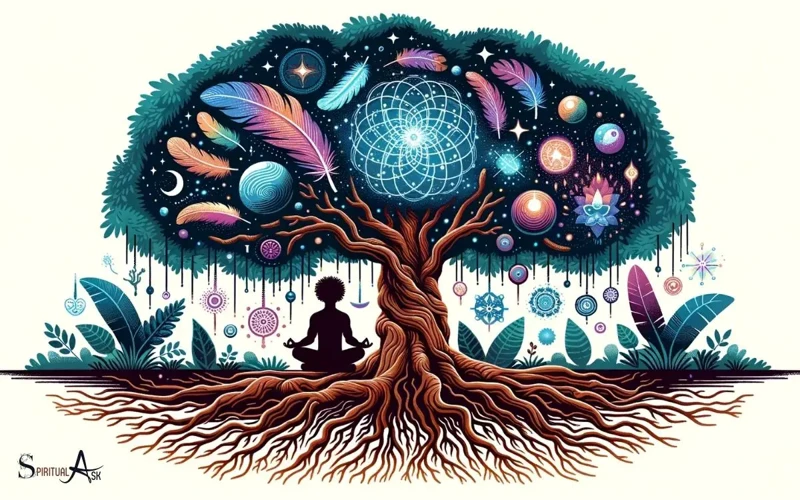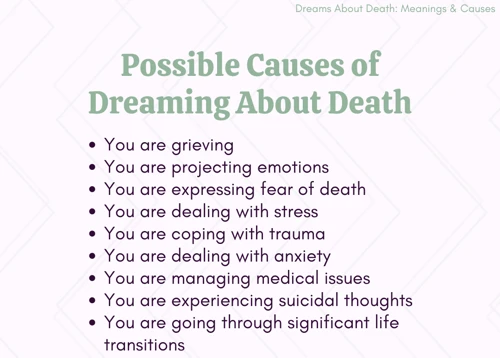Have you ever experienced a dream about someone who has passed away? It can be a perplexing and emotionally charged experience. Dreams have long been a source of fascination and wonder, with many believing that they hold some deeper meaning or message. When you dream about someone who has died, it can leave you feeling curious and even unsettled. In this article, we will explore the significance of dreams, the different types of dreams about the deceased, and how to interpret and find comfort in these dreams. So, let’s delve into the mysterious realm of dreaming and uncover the meaning behind these encounters with those who have passed on.
The Significance of Dreams

Dreams have always held a profound and enigmatic significance in human culture and psychology. They serve as a bridge between the conscious and subconscious mind, offering glimpses into our deepest thoughts, emotions, and desires. One of the most intriguing aspects of dreams is their potential for communication. Whether it’s with ourselves, others, or even those who have passed away, dreams can convey messages that elude our waking awareness. Additionally, dreams play a crucial role in psychological processing, helping us make sense of our experiences and emotions. They provide a safe space for us to explore unresolved issues and find resolutions. Finally, dreams are often viewed as windows to the spiritual realm, allowing for connections with those who have departed from this world. The significance of dreams lies not only in their ability to entertain and confuse us but also in their potential to shed light on the deeper aspects of our being.
1. Dreams as Communication
– Dreams serve as a means of communication between the conscious and subconscious mind.
– They can convey messages and insights that may elude our waking awareness.
– Dreams can provide us with guidance, warnings, or even comfort from those who have passed away.
– They offer a unique channel through which we can connect with our own inner thoughts and emotions.
– Dream communication can also extend beyond ourselves, allowing for connections with others on a deeper level.
2. Psychological Processing
Psychological processing is a key function of dreams, helping individuals navigate and make sense of their emotions, experiences, and unresolved issues. Dreams provide a symbolic language through which the mind can process and integrate challenging or complex thoughts. They offer a safe platform for exploring suppressed emotions and unresolved conflicts, allowing individuals to confront and address them in the dream world. Through this psychological processing, dreams offer an opportunity for emotional healing and growth. Additionally, dreams can act as a form of catharsis, helping to release built-up tension and provide a sense of relief. They serve as a vehicle for the mind to process and make sense of the complexities of life, providing valuable insights and understanding.
3. Spiritual Connections
Dreams can also be seen as a means of establishing spiritual connections with those who have passed away. Many individuals believe that dreams provide an opportunity for souls to communicate beyond the boundaries of this physical world. These dreams may feel vivid, intense, and even different from ordinary dreams. They might involve a sense of presence or an unmistakable feeling of connection with the deceased loved one. Some people report receiving messages, guidance, or even comfort from these dream encounters. These spiritual connections in dreams can offer solace, reassurance, and a sense of continuing bonds with those who have crossed over.
Types of Dreams About the Deceased

When it comes to dreams about the deceased, there are various types that one may experience. The first is visitation dreams, which are characterized by a vivid and realistic encounter with the deceased person. These dreams often leave a lasting impression and are believed to be a form of communication or visit from the spirit realm. Symbolic dreams, on the other hand, involve the use of symbols and metaphors to convey a message or meaning. These dreams may not directly feature the deceased but may contain elements that represent them or evoke memories associated with them. Lastly, processing dreams serve as a way for the mind to process grief, loss, and unresolved emotions related to the death of a loved one. These dreams can be cathartic and provide an opportunity for healing and emotional release. Whether it’s a visitation dream, a symbolic dream, or a processing dream, each type offers a unique perspective on the connection between dreams and the deceased.
1. Visitation Dreams
Visitation dreams are a unique and profound type of dream experience that involves the presence of a deceased loved one. These dreams often feel incredibly real, as if the person is truly visiting us from beyond. During visitation dreams, individuals report seeing, hearing, or even interacting with the deceased person. The encounter may be comforting, providing a sense of closure or reassurance, or it may serve as a way for the departed loved one to deliver a specific message or guidance. Visitation dreams can be intensely emotional and may leave a lasting impact on the dreamer, providing a sense of connection and healing in the grieving process.
2. Symbolic Dreams
Symbolic dreams, as the name suggests, are dreams that communicate through symbols and metaphors. Rather than providing a literal representation, these dreams use symbolic imagery to convey deeper meanings and messages. Each symbol in the dream may hold personal significance, and decoding them can help unravel the hidden messages within. For example, dreaming of a butterfly may symbolize transformation and growth, while dreaming of a locked door may represent obstacles or a desire for privacy. These symbols can vary greatly from person to person, making it important to consider one’s personal associations and emotions connected to each symbol. Interpreting these symbolic dreams requires a keen awareness of one’s own subconscious mind and the ability to decipher the unique language of symbolism that unfolds during sleep.
3. Processing Dreams
– Processing dreams are a type of dream that helps us process and work through our emotions and experiences.
– These dreams often occur during times of grief or significant life changes, allowing us to emotionally process and heal.
– In processing dreams, we may revisit memories, confront unresolved issues, or find closure in certain situations.
– These dreams provide a space for us to explore and release pent-up emotions, leading to a sense of catharsis and emotional growth.
– It is important to pay attention to the themes and symbols in processing dreams, as they can offer valuable insights into our subconscious mind and emotional state.
– Engaging in self-reflection and journaling can be helpful for deciphering the meaning and purpose behind these dreams.
Interpreting Dreams About Deceased Loved Ones

When it comes to interpreting dreams about deceased loved ones, there are several key factors to consider. First and foremost, pay attention to the feeling of presence within the dream. The emotional connection you experience can provide valuable insight into the message or purpose of the dream. Additionally, pay attention to any symbolic elements that may appear. These symbols can hold personal significance or represent broader themes related to your relationship with the deceased. It’s also important to consider the emotional relevance of the dream. How did it make you feel? Did it bring comfort, closure, or even unresolved emotions to the surface? Lastly, consider the personal context in which the dream occurs. Are there any significant events or anniversaries happening in your life? These factors can contribute to the overall meaning of the dream. By reflecting on these elements and exploring the unique aspects of your dream, you can gain a deeper understanding of the message and find comfort and meaning in your connection with your deceased loved one.
1. Feeling of Presence
Feeling the presence of a deceased loved one in a dream can be a powerful and emotionally charged experience. In these dreams, you may have a vivid sense of their presence, as if they are physically there with you. This can include hearing their voice, seeing their face, or even feeling their touch. The feeling of presence in dreams about someone who has died can be a comforting and reassuring experience. It can provide a sense of connection and closure, allowing you to feel their love and support once again. Pay attention to the details of these dreams, as they may hold important messages or insights from your loved one beyond the simple feeling of their presence.
2. Symbolic Elements
Symbolic elements in dreams involving deceased loved ones carry significant meaning. When you dream about someone who died, pay close attention to the symbols and imagery present in the dream. These symbolic elements often represent deeper emotions, messages, or unresolved issues related to the deceased individual. For example, seeing a butterfly in your dream may symbolize transformation or the soul’s journey after death. Similarly, a clock ticking may represent the limited time you had with the person or the need to cherish each fleeting moment in life. By analyzing and interpreting these symbolic elements, you can gain insight into the messages your dream is trying to convey.
3. Emotional Relevance
– Dreams about deceased loved ones often carry a strong emotional relevance. The feelings evoked during these dreams can be intense and may reflect the emotions we experienced when the person was alive or during the process of grieving. The dream may bring back the joy of past memories, unresolved conflicts, or even guilt and regret. It is essential to pay attention to the emotions experienced within the dream as they can provide valuable insight into our emotional state and help us process and heal from the loss. By acknowledging and exploring these emotions, we can find a sense of closure and acceptance.
4. Personal Context
When interpreting dreams about deceased loved ones, it’s essential to consider the personal context surrounding the dream. This involves reflecting on your relationship with the person who has passed away, the emotions and memories associated with them, and any specific events or circumstances that may be relevant. Pay attention to the specific details of the dream, such as the setting, the interactions, and the emotions experienced. Consider how these elements relate to your personal history and experiences with the deceased individual. By examining the dream within the framework of your unique context, you can gain deeper insights into its meaning and significance. Remember that dreams are highly subjective, and the personal context plays a crucial role in unraveling their true message.
Finding Comfort and Meaning
Finding comfort and meaning in dreams about deceased loved ones can be a deeply personal and healing journey. When we dream about someone who has passed away, it can stir up a range of emotions, including grief, longing, and even joy. One way to find solace is to embrace the message or presence of the deceased in the dream. Pay attention to the emotions and insights that arise during and after the dream, as they might hold valuable guidance or closure. Seeking support from loved ones or professionals who understand the impact of loss and dreams can also provide comfort and validation. Reflecting on the dream and emotionally processing the experience is equally important. By expressing your feelings, journaling, or engaging in activities that help integrate the dream, you can find a sense of peace and understanding. Each person’s journey towards finding comfort and meaning in dreams about deceased loved ones is unique, but by honoring and exploring these dreams, you can navigate the path of healing and acceptance.
1. Embrace the Message
When you have a dream about someone who has died, it’s important to embrace the message that the dream may be carrying. Pay attention to any symbols, emotions, or interactions that stand out in the dream. These elements can provide valuable insights into your own thoughts, feelings, and desires. Reflect on the dream and consider what it might be trying to communicate to you about your relationship with the deceased person or any unfinished business that may still need attention. Embracing the message of the dream can help provide closure, healing, and a deeper understanding of your own emotional journey.
2. Seek Support
Seeking support is crucial when you have dreams about someone who has passed away. Talking to others who have experienced similar dreams or seeking guidance from a counselor or therapist can provide you with the understanding and comfort you need. Sharing your dreams and emotions with trusted individuals can help you process your feelings and gain perspective. They can offer validation, reassurance, and different perspectives that may help you navigate through the complexities of your dreams. Remember, you don’t have to face your dreams alone, and seeking support can be an essential step towards finding solace and meaning in your experiences.
3. Reflect and Emotionally Process
Reflecting and emotionally processing the dreams about deceased loved ones is an important step in finding comfort and meaning. Take some time to sit with the emotions that arise from the dream and reflect on any insights or messages that may have been conveyed. It can be helpful to write down your thoughts and feelings in a journal or share them with a trusted friend or therapist. Allow yourself to fully experience and express your emotions, whether it’s grief, sadness, love, or even joy. Consider how the dream may connect to your personal experiences and relationships with the deceased. By engaging in this reflective and emotional process, you can gain a deeper understanding of the dream’s significance and its impact on your healing journey.
Conclusion
– Dreams about deceased loved ones can hold significant meaning and provide comfort to those who experience them. They can act as a form of communication, helping us process emotions, and make spiritual connections.
– Interpreting these dreams requires attention to the feeling of presence, symbolic elements, emotional relevance, and personal context.
– Finding comfort and meaning in these dreams involves embracing the messages they may bring, seeking support from others, and taking time to reflect and emotionally process the experience.
– While dreams about deceased loved ones can be intense and emotional, they can also provide solace and a sense of continued connection with those who have passed away.
– Exploring the significance of dreams and understanding their possible interpretations can lead to a deeper understanding of ourselves and our relationships with the deceased.
Frequently Asked Questions
1. Why do we dream about deceased loved ones?
Dreams about deceased loved ones can occur for various reasons, including a desire for connection, unresolved emotions, or a need for closure. These dreams may also serve as a way for our subconscious mind to process grief and find comfort.
2. Are dreams about the deceased a form of communication?
Many people believe that dreams about the deceased can be a form of communication. While scientific research on this topic is limited, these dreams can provide a sense of connection and may carry messages or symbolism that can offer comfort or guidance.
3. Why do some people have frequent dreams about a deceased person?
Frequent dreams about a deceased person can occur if the loss had a significant emotional impact or if there are unresolved issues surrounding their passing. These dreams may continue until the individual finds emotional healing or resolution.
4. Are dreams about the deceased always comforting?
No, dreams about the deceased can vary in their emotional tone. While some dreams may be comforting and offer a sense of solace, others may evoke sadness, confusion, or even fear. Each dream is unique and may reflect the individual’s emotional state and personal experiences.
5. Can dreams about the deceased have a symbolic meaning?
Yes, dreams about the deceased often involve symbolic elements that can provide deeper insights into the dreamer’s emotions, relationships, or life circumstances. These symbols should be interpreted within the context of the dreamer’s personal experiences and beliefs.
6. Can dreams about the deceased predict the future?
There is no scientific evidence to support the claim that dreams about the deceased can predict the future. However, some individuals may interpret these dreams as intuitive or precognitive, attributing them to a deeper spiritual connection or heightened intuition.
7. How can I find comfort in dreams about the deceased?
Finding comfort in dreams about the deceased can involve embracing the message or symbolism within the dream, seeking support from friends, family, or support groups, and taking time to reflect and emotionally process the experience.
8. Should I share my dreams about the deceased with others?
Sharing dreams about the deceased is a personal choice. Some individuals may find comfort and validation in discussing their dreams with loved ones or seeking insights from professionals in the field. However, others may prefer to keep these dreams private and reflect on them individually.
9. Can dreams about the deceased help with the grieving process?
Yes, dreams about the deceased can play a role in the grieving process. They can provide an opportunity to express emotions, receive messages of comfort, and gain a sense of closure. However, it’s important to remember that each person’s grief journey is unique, and dreams are just one aspect of the healing process.
10. Do different cultures interpret dreams about the deceased differently?
Yes, interpretations of dreams about the deceased can vary across different cultures and belief systems. Some cultures view these dreams as direct spiritual communications, while others may interpret them symbolically or as manifestations of the dreamer’s own psychological processes. It’s essential to respect and consider diverse cultural perspectives when exploring the meaning of these dreams.







